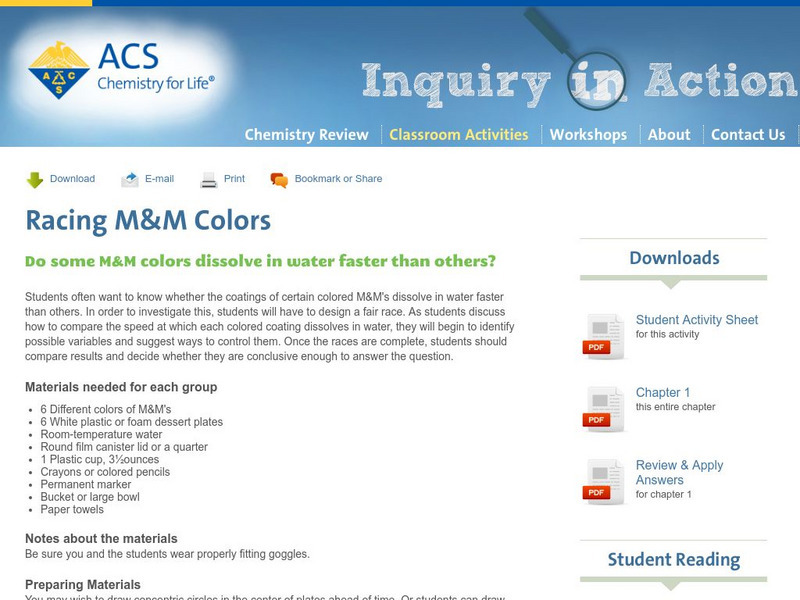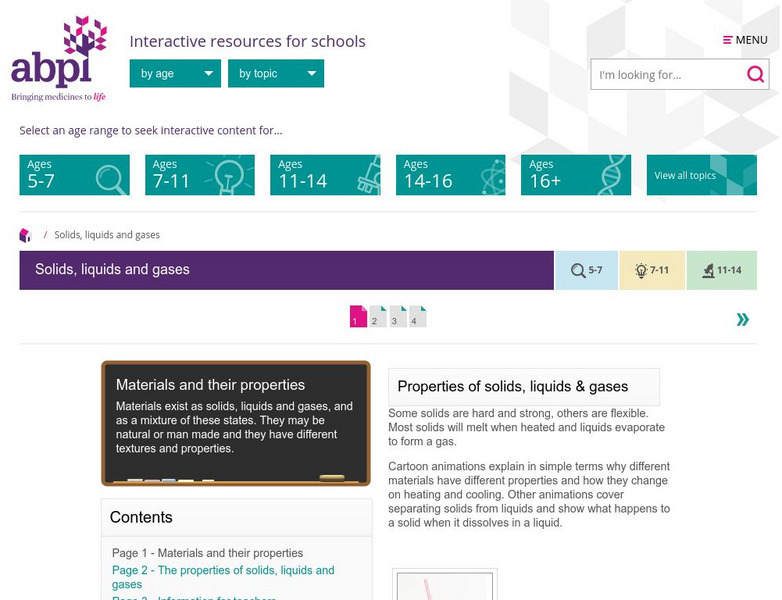Baylor College
What Dissolves in Water?
One of water's claims to fame is as the universal solvent. Young physical scientists experiment to discover which materials dissolve in this special compound. You could never be more prepared for teaching this activity than by using this...
Curated OER
Review of Ionic and Covalent Compounds and Transitioning from Ionic to Covalent Compounds
Here is a unique assigment: compare and contrast ionic and covalent compounds in an extensive data table and then analyze Lewis dot structures in antoher. Three columns are to befilled in: "characteristic or feature," "applies to ionic...
Curated OER
Mixtures
For this chemistry worksheet, students use the clues given at the bottom of the sheet to complete the crossword puzzle on mixtures. There are 18 clues to solve on the sheet.
Curated OER
Polymerization Experiments
Learners study the concepts of polymerization and the function of crosslinkage. In this polymer activity students complete a lab activity and write down their observations.
Curated OER
Solubility Lab
In this solubility worksheet, students test a variety of polar and non polar substances to determine which ones will dissolve in vegetable oil and which ones will dissolve in water. Students collect data and answer 2 questions about...
Curated OER
Dissolving Solids and Gases
In this dissolving solids and gases worksheet, high schoolers learn that the process of dissolving gas is opposite of the process of dissolving solids. Students answer 3 critical thinking questions about dissolving gases and solids in...
Curated OER
Solubility Curves
In this solubility worksheet, students use a solubility curve to determine is different solutions are saturated or not. This worksheet has 19 problems to solve and 2 short answer questions.
Curated OER
The Effect of Temperature on Solubility
In this solubility worksheet, students conduct an experiment to see how temperature effects the solubility of salt in water. Students record their data in a chart and then graph the results. Then students complete 2 short answer questions.
Curated OER
A Tasty Solution
In this solutions instructional activity, students complete a three step procedure and record the dissolving time of candy. Using their data they create a graph and answer 4 analysis questions.
Curated OER
Water - the (Nearly) Universal Solvent
In this solvent worksheet, students explore why water is considered a universal solvent. Students explore what can change dissolving rates. This worksheet has 8 matching, 3 short answer, 11 fill in the blank, and 4 problems to solve.
Curated OER
The Formation of Solutions
In this solutions worksheet, students compare situations that increase or decrease the solubility of a solute. Students describe how surface area, stirring, and temperature can increase the rate of dissolving a solute. This worksheet has...
Curated OER
Solids and Water
Students investigate mixtures made of water and familiar solid materials. They observe and discuss the changes that occur immediately and set the mixtures aside for a day. Finally, students observe the mixtures, note changes, and graph...
Curated OER
Colligative Properties Worksheet
In this solutions worksheet, learners determine the boiling points and melting points of solutions. Students calculate the effective molality of a solute. This worksheet has five problems to solve.
Curated OER
What Happens When You Mix Things?
In this mixtures worksheet, students complete 3 statements about what happens when you mix things together. This worksheet is a graphic organizer.
Curated OER
How Does Matter Change?
In this matter instructional activity, students will fill in the blank of 3 statements that show facts about the changes that can happen to matter. Students will then fill in the blank of 1 conclusion statement.
Curated OER
What Properties Do Solutions Have?
In this solutions worksheet, students will write down two properties that solutions have and then will come up with a conclusion about solutions based on their facts.
American Chemical Society
Inquiry in Action: Mysterious M&m's
Students will ask questions and learn more about dissolving in this activity where they place M&M in water. Activity includes students activity sheet and teacher instructions.
American Chemical Society
Inquiry in Action: Racing M&m Colors
An activity where students can experiment with whether different colors of M&Ms dissolve faster in water versus others. This lab includes a student worksheet and teacher instructions.
American Chemical Society
Inquiry in Action: Colors Collide or Combine
Do M&Ms colors combine or collide when they are put together on a plate of water? This lab activity will have students investigating what happens when M&Ms get wet.
Science and Mathematics Initiative for Learning Enhancement (SMILE)
Smile: Solubility of Gases in Liquids
Lab activity where students determine the relationship of pressure and temperature on gas solubility.
The Association of the British Pharmaceutical Industry
Abpi: Solids, Liquids, and Gases
Students learn about solids, liquids, and gases in this interactive slide show. Animated cartoon characters explain concepts having to do with properties of matter. A self-checking quiz follows the lesson.
American Chemical Society
Middle School Chemistry: Chapter 5: The Water Molecule and Dissolving
Nine exemplary chemistry lessons about the water molecule and dissolving complete with handouts and animations.
American Chemical Society
American Chemical Society: Science for Kids: Chemical and Physical Change
Engaging hands-on science lessons for grades 2-6 on chemical and physical changes.
BBC
Bbc Schools: Ks2 Bitesize: Science: Materials: Changes in Materials
Help solve the mystery and find the missing crystal. Following the activity, read more about chemical and physical changes, and then take a quick quiz to check for understanding.

























